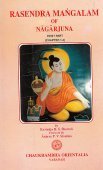Samyanc, Samyak, Samyañc, Samyag: 21 definitions
Introduction:
Samyanc means something in Buddhism, Pali, Hinduism, Sanskrit, Jainism, Prakrit, Marathi, Hindi. If you want to know the exact meaning, history, etymology or English translation of this term then check out the descriptions on this page. Add your comment or reference to a book if you want to contribute to this summary article.
Alternative spellings of this word include Samyamch.
Images (photo gallery)
In Hinduism
Shaivism (Shaiva philosophy)
Source: Brill: Śaivism and the Tantric TraditionsSamyañc (सम्यञ्च्) refers to “perfect” (Cf. Samyagāveśana—‘complete entering’), according to the Īśvarapratyabhijñāvivṛtivimarśinī (KSTS vol. 65, 327–331).—Accordingly, “[Utpala teaches that] the ‘distinguishing mark of samāveśa’ is ‘insight,’ since it is opposed to the Impurity that is ignorance, being characterized by a perfect (samyag), that is to say complete (‘ā samantāt’), entry into one’s true nature, obtaining which one becomes a gnostic (jñānī), and practicing which, on the levels of body, prāṇa, etc., one becomes a Yogī, due to attaining the glory (vibhava) that is an intrinsic quality of infinite Consciousness.”.
Source: SOAS University of London: Protective Rites in the Netra TantraSamyak (सम्यक्) refers to “(being) true”, according to the Netratantra of Kṣemarāja: a Śaiva text from the 9th century in which Śiva (Bhairava) teaches Pārvatī topics such as metaphysics, cosmology, and soteriology.—Accordingly, [verse 22.17ab]—“Sa is that which is self-perceived, true (samyak), possesses the attribute of gratification, the receptacle of all amṛta, together with visarga, and the highest auspicious thing (i.e., Śiva), which is full and uninterrupted, without any breaks”.

Shaiva (शैव, śaiva) or Shaivism (śaivism) represents a tradition of Hinduism worshiping Shiva as the supreme being. Closely related to Shaktism, Shaiva literature includes a range of scriptures, including Tantras, while the root of this tradition may be traced back to the ancient Vedas.
In Buddhism
Mahayana (major branch of Buddhism)
Source: academia.edu: A Study and Translation of the GaganagañjaparipṛcchāSamyañc (सम्यञ्च्) refers to “complete (awakening)”, according to the Gaganagañjaparipṛcchā: the eighth chapter of the Mahāsaṃnipāta (a collection of Mahāyāna Buddhist Sūtras).—Accordingly, “[...] Then a voice resounded from open space, saying: ‘The Bodhisattva, the great being Gaganagañja has praised in verses the complete unsurpassable awakening (anuttara-samyañc-saṃbodhi) which has been fully accomplished by the Buddhas in uncountable hundreds, thousands, millions, billions of ages. However, these Bodhisattvas cannot see this [awakening] as object even in their dreams because of their attachment. Having heard this guiding principle of the dharma in verses, attained it and believe it, whoever will gradually attain the lion’s roar like that of Bodhisattva Gaganagañja’.”

Mahayana (महायान, mahāyāna) is a major branch of Buddhism focusing on the path of a Bodhisattva (spiritual aspirants/ enlightened beings). Extant literature is vast and primarely composed in the Sanskrit language. There are many sūtras of which some of the earliest are the various Prajñāpāramitā sūtras.
In Jainism
General definition (in Jainism)
Source: Encyclopedia of Jainism: Tattvartha SutraSamyak (सम्यक्, “right”).—What is the meaning of the word ‘right’ (samyak)? The word ‘right’ here is synonymous with correct /true /real or laudatory. How is the word samyak derived or created? The word samyak in Saṃskṛta language is derived from the root verb ‘añc’ with the proposition ‘sam’ and the suffix ‘kvip’.
To which quality out of the three mentioned the word ‘right’ is to be added? The word ‘right’ should be added to all the three qualities i.e. right faith (darśana), right knowledge (jñāna) and right conduct (cāritra).

Jainism is an Indian religion of Dharma whose doctrine revolves around harmlessness (ahimsa) towards every living being. The two major branches (Digambara and Svetambara) of Jainism stimulate self-control (or, shramana, ‘self-reliance’) and spiritual development through a path of peace for the soul to progess to the ultimate goal.
Languages of India and abroad
Marathi-English dictionary
Source: DDSA: The Molesworth Marathi and English DictionarySamyak (सम्यक्).—ad S Properly, fitly, in the right manner.
Marathi is an Indo-European language having over 70 million native speakers people in (predominantly) Maharashtra India. Marathi, like many other Indo-Aryan languages, evolved from early forms of Prakrit, which itself is a subset of Sanskrit, one of the most ancient languages of the world.
Sanskrit dictionary
Source: DDSA: The practical Sanskrit-English dictionarySamyañc (सम्यञ्च्).—a. (samīcī f.)
1) Going with, accompanying; यजन्ते याजकाः सम्यक्परिवारं शुभार्थिनः (yajante yājakāḥ samyakparivāraṃ śubhārthinaḥ) Mahābhārata (Bombay) 3.13. 16.
2) Right, fit, proper due; अपि चेत् सुदुराचारो भजते मामनन्यभाक् । साधुरेव स मन्तव्यः सम्यग्व्यवसितो हि सः (api cet sudurācāro bhajate māmananyabhāk | sādhureva sa mantavyaḥ samyagvyavasito hi saḥ) || Bhagavadgītā (Bombay) 9.3.
3) Correct, true, accurate.
4) Pleasant, agreeable; किं च कुलानि कवीनां निसर्गसम्यञ्चि रञ्जयतु (kiṃ ca kulāni kavīnāṃ nisargasamyañci rañjayatu) R. G.
5) Same, uniform.
6) All, whole, entire.
-ind. (samyak) 1) With, together with.
2) Well, properly, rightly, correctly, truly; सम्य- गियमाह (samya- giyamāha) Ś.1; तेषु सम्यग्वर्तमानो गच्छत्यमरलोकताम् (teṣu samyagvartamāno gacchatyamaralokatām) Manusmṛti 2.5,14.
3) Duly, suitably, correctly, truly.
4) Honourably.
5) Completely, thoroughly.
6) Distinctly.
See also (synonyms): samyac.
Source: Cologne Digital Sanskrit Dictionaries: Edgerton Buddhist Hybrid Sanskrit DictionarySamyak (सम्यक्).—(1) right, proper, in rāśiṃ samyak (for Sanskrit samyañcam; acc. m.) Mahāvastu i.175.16 (verse) = samyaktvani- yata rāśi, qq.v.; (2) (= Pali samma, which corresp. in use to Sanskrit saumya, falsely Sktized by confusion with Pali sammā, AMg. samma, = Sanskrit samyak), interj. of friendly address, friend, comrade: samyag Jyoti(ṣ)pāla Mahāvastu i.319.18; 320.1, 13, 19, etc., said by the potter Gha- ṭikāra to his friend J.
Source: Cologne Digital Sanskrit Dictionaries: Shabda-Sagara Sanskrit-English DictionarySamyak (सम्यक्).—Ind. 1. All, wholly. 2. Duly. 3. By honourable means. 4. Distinctly. 5. With, together with. 6. Properly, fitly: see samyac .
Source: Cologne Digital Sanskrit Dictionaries: Benfey Sanskrit-English DictionarySamyañc (सम्यञ्च्).—i. e. sama-añc (the final a of sama is changed to ī, as before as, kṛ, bhū), I. adj., f. mīcī. 1. Going with, accompanying. 2. Same, common, uniform. 3. Accurate, correct. 4. Right, true. 5. Pleasant, agreeable. Ii. acc. sing. n. yak, adv. 1. Properly, fitly, rightly, [Mānavadharmaśāstra] 2, 14; well, [Pañcatantra] 134, 7; [Vikramorvaśī, (ed. Bollensen.)] 39, 7. 2. Duly, [Mānavadharmaśāstra] 3, 76; [Pañcatantra] 128, 17. 3. By honourable means, [Mānavadharmaśāstra] 7, 60. 4. Distinctly, [Mānavadharmaśāstra] 2, 101; [Pañcatantra] 167, 6. 5. Wholly, completely, [Pañcatantra] 72, 17. 6. Comprehensively, [Mānavadharmaśāstra] 2, 89. 7. With, [Nala] 9, 8. 8. Together, [Lassen, Anthologia Sanskritica.] 98, 14 = [Rigveda.] v. 9, 5.
Source: Cologne Digital Sanskrit Dictionaries: Cappeller Sanskrit-English DictionarySamyak (सम्यक्).—v. samyañc.
Source: Cologne Digital Sanskrit Dictionaries: Cappeller Sanskrit-English DictionarySamyañc (सम्यञ्च्).—[feminine] samīcī or samīcī turned to one point or against each other, universus or adversus; whole, entire, all; correct, right, true. [neuter] samyak [adverb] towards one point, together, truly, correctly, exactly, duly, thoroughly; [with] neg. not at all.
Source: Cologne Digital Sanskrit Dictionaries: Monier-Williams Sanskrit-English Dictionary1) Samyañc (सम्यञ्च्):—[=samy-añc] mfn. ([from] sami = sam2 + 2. añc cf. [Pāṇini 6-3, 93]; [nominative case] samyan, samīcī, or samīcī, samyak) going along with or together, turned together or in one direction, combined, united ([accusative] with √dhā, ‘to unite or provide with’ [accusative] or [dative case] of [person] and [instrumental case] or [accusative] of thing), entire, whole, complete, all (samyañcaḥ sarve, ‘all together’), [Ṛg-veda; Brāhmaṇa; Śāṅkhāyana-śrauta-sūtra]
2) [v.s. ...] turned towards each other, facing one another, [Ṛg-veda; Vājasaneyi-saṃhitā; Brāhmaṇa]
3) [v.s. ...] lying in one direction, forming one line (as foot steps), [Śatapatha-brāhmaṇa]
4) [v.s. ...] correct, accurate, proper, true, right, [Bhāgavata-purāṇa]
5) [v.s. ...] uniform, same, identical, [Horace H. Wilson]
6) [v.s. ...] pleasant, agreeable, [ib.]
Source: Cologne Digital Sanskrit Dictionaries: Monier-Williams Sanskrit-English Dictionary1) Samyak (सम्यक्):—[=samy-ak] [from samy-añc] a ind. in one or the same direction, in the same way, at the same time, together (with √sthā, ‘to associate with’), [Ṛg-veda; Mahābhārata]
2) [v.s. ...] in one line, straight (opp. to akṣṇayā, ‘obliquely’), [Śatapatha-brāhmaṇa; Kātyāyana-śrauta-sūtra]
3) [v.s. ...] completely, wholly, thoroughly, by all means (with na, ‘by no means, not at all’), [Manu-smṛti; Mahābhārata] etc.
4) [v.s. ...] correctly, truly, properly, fitly, in the right way or manner, well, duly (with √kṛ, ‘to make good [a promise]’), [Upaniṣad; Manu-smṛti; Mahābhārata] etc.
5) [v.s. ...] distinctly, clearly, [Monier-Williams’ Sanskrit-English Dictionary]
6) [from samy-añc] b in [compound] for samyañc.
Source: Cologne Digital Sanskrit Dictionaries: Monier-Williams Sanskrit-English DictionarySamyag (सम्यग्):—[from samy-añc] in [compound] for samyañc.
Source: Cologne Digital Sanskrit Dictionaries: Yates Sanskrit-English DictionarySamyak (सम्यक्):—adv. All, wholly; fitly.
Source: DDSA: Paia-sadda-mahannavo; a comprehensive Prakrit Hindi dictionary (S)Samyañc (सम्यञ्च्) in the Sanskrit language is related to the Prakrit words: Samia, Samma.
Source: DDSA: Paia-sadda-mahannavo; a comprehensive Prakrit Hindi dictionary (S)Samyag (सम्यग्) in the Sanskrit language is related to the Prakrit words: Samiaṃ, Sammaṃ.
[Sanskrit to German]
Sanskrit, also spelled संस्कृतम् (saṃskṛtam), is an ancient language of India commonly seen as the grandmother of the Indo-European language family (even English!). Closely allied with Prakrit and Pali, Sanskrit is more exhaustive in both grammar and terms and has the most extensive collection of literature in the world, greatly surpassing its sister-languages Greek and Latin.
Hindi dictionary
Source: DDSA: A practical Hindi-English dictionarySamyak (सम्यक्):—(adv and a) thoroughly, completely, wholly; duly, well; due.
Source: DDSA: A practical Hindi-English dictionarySamyag (सम्यग्):——an allomorph of [samyak] as it appears in some compound words; [jñāna/bodha] precise knowledge, thorough knowledge; [vāk] precise in speech.
...
See also (Relevant definitions)
Starts with (+17): Samyag-marga, Samyagajiva, Samyagaveshana, Samyagbhakti, Samyagdarshana, Samyagdrishti, Samyagjnana, Samyagmithyadrishti, Samyagukta, Samyagvak, Samyagviddha, Samyagvyayama, Samyakcaritra, Samyakcharitra, Samyakkarmanta, Samyakkriya, Samyakpatha, Samyakprahana, Samyakprajna, Samyakpratipatti.
Ends with: Asamyanc.
Full-text (+201): Samia, Ratnatraya, Samyagdrishti, Samyakpatha, Samyagajiva, Samica, Asamyanc, Samyagvritti, Samyakta, Samyagdandana, Samyagvak, Samyaksmriti, Samyagdrishtitva, Samyagjnanatva, Samyac, Samyaksambuddha, Samyagdarshanasampanna, Samyagdrish, Samyagvijayin, Samyagvyavasita.
Relevant text
Search found 96 books and stories containing Samyanc, Samyak, Samyañc, Samyag; (plurals include: Samyancs, Samyaks, Samyañcs, Samyags). You can also click to the full overview containing English textual excerpts. Below are direct links for the most relevant articles:
Amarakoshodghatana of Kshirasvamin (study) (by A. Yamuna Devi)
Philosophy (7): Buddhist philosophical concepts < [Chapter 4 - Cultural Aspects]
Etymological Derivations of Kṣīrasvāmin < [Chapter 6 - Grammatical Aspects]
The Buddhist Path to Enlightenment (study) (by Dr Kala Acharya)
2(b). The Noble Eightfold Path (Ariya-aṭṭhaṅgika-magga) < [Chapter 3 - Seven Factors of Enlightenment and Noble Eightfold Path]
2.3. Right Speech (Sammā-vācā or Samyag-vāc) < [Chapter 3 - Seven Factors of Enlightenment and Noble Eightfold Path]
2.4. Right Action (Sammā-kammanta or Samyak-karmānta) < [Chapter 3 - Seven Factors of Enlightenment and Noble Eightfold Path]
Rig Veda (translation and commentary) (by H. H. Wilson)
Brihad Bhagavatamrita (commentary) (by Śrī Śrīmad Bhaktivedānta Nārāyana Gosvāmī Mahārāja)
Verse 2.3.152 < [Chapter 3 - Bhajana (loving service)]
Verse 2.3.98 < [Chapter 3 - Bhajana (loving service)]
Verse 1.4.87 < [Chapter 4 - Bhakta (the devotee)]
The Fo-Sho-Hing-Tsan-King (A Life of Buddha) (by Samuel Beal)
Varga 15. Turning The Law-Wheel < [Kiouen III]
Varga 17. The Great Disciple Becomes A Hermit < [Kiouen IV]
Varga 1. The Birth < [Kiouen I]
Manusmriti with the Commentary of Medhatithi (by Ganganatha Jha)
Verse 3.28 < [Section IV - The Eight Forms of Marriage]
Verse 3.187 < [Section X - Method of Invitation]
Verse 11.71 < [Section VII - Special Expiation for Special Offences: (a) For Killing a Brāhmaṇa]
Related products



